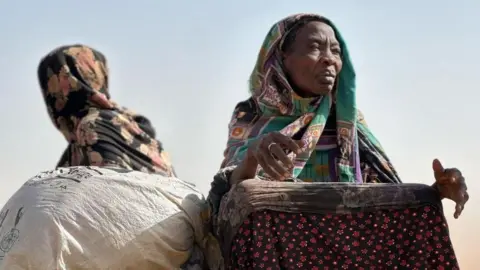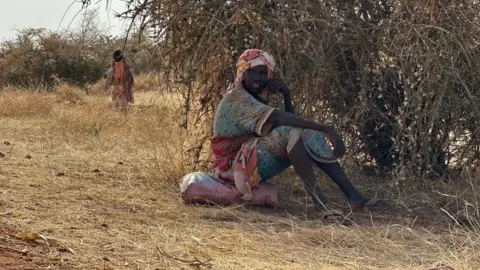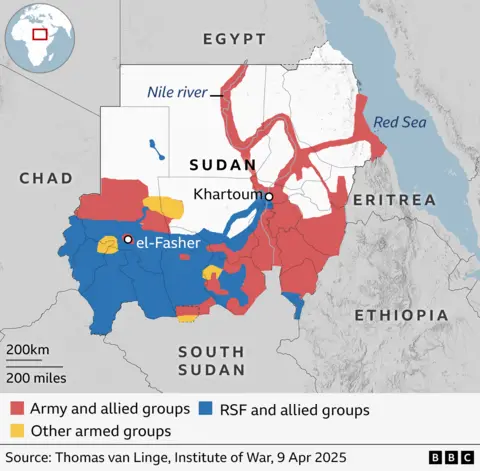'We cannot look away' - UK hosts Sudan talks as famine takes hold
 BBC
BBCA high-level international conference is under way in London to find "a pathway to peace" in Sudan, in the words of one of the hosts, the UK's Foreign Secretary David Lammy.
Sudan's civil war began exactly two years ago causing what aid agencies call the world's worst humanitarian crisis.
The UK is promising an extra £120m ($159m) worth of food and medical assistance.
Charities say 30 million people in Sudan are in desperate need, and people are starving as a result of the war.
"Many have given up on Sudan – that is wrong – it's morally wrong when we see so many civilians beheaded, infants as young as one subjected to sexual violence, more people facing famine than anywhere else in the world... We simply cannot look away," Lammy said opening the meeting on Tuesday.
Also in attendance is the head of UN's refugee agency, Filippo Grandi, who earlier warned the world would face "catastrophic consequences" if it continued to turn its back on the people of Sudan.
More than 12 million have been forced from their homes in Sudan and tens of thousands killed, amid a genocide in Darfur and reports of rape being used as a weapon of war across the country.
In recent days, the Rapid Support Forces (RSF) launched an intense ground and aerial assault on camps for displaced people close to the city of el-Fasher in an attempt to seize the last state capital in Darfur held by their rival, the Sudanese army.
A vast camp for displaced people called Zamzam, which has provided temporary shelter for an estimated 500,000, is now being systematically destroyed by fire from intentional arson by RSF forces, according to the Yale School of Public Health's Humanitarian Research Lab, which has analysed satellite images taken of the camp.
"There's a brazenness that characterises these acts," Ravina Shamdasani, a UN Human Rights Office spokeswoman, told the BBC's Newshour programme.
"We've heard accounts of men walking in and raping the women and saying to them: 'We are your men now.' We have accounts of RSF militants who've killed young men and then gone to the mothers of those young men and said: 'We will protect you now'."
"Can you imagine the panic and the anxiety [knowing] that now you're in the hands of these people? There is a brazenness that is fuelled by impunity... when we talk about how to bring this conflict to an end, one of the key things is pushing for accountability."
When the violence in el-Fasher got too much Nusra left home and fled to Zamzam last year, and five members of her family including one of her sons have died since then - most of them killed by fighters shelling the refugee camp.
"The RSF burned down the only field hospital" in Zamzam, she tells the BBC, and "killed more than three volunteers and nine staff members of Relief International". She also says "the RSF shut down the only market inside the camp and blocked water tankers" trying to reach the residents.
The RSF has not commented on these latest allegations but recently said that it was not attacking civilians in Zamzam.
Meanwhile the aid group Doctors Without Border (MSF) says that over 20,000 people have fled to the town of Tawila in North Darfur in under two days.
"Some of them are dead upon arrival, others are lacking water, food. They didn't drink a drop of water for two days, and children are dying of thirst. So water is the main need here," MSF's Marion Ramstein told the BBC.
Some survivors told the BBC they were robbed by armed gangs as they fled, and that they had to make the heart-breaking decision to leave injured people behind because they could not carry them.
"Looting gangs on the way took everything we owned and we have sick relatives with us. We left our mothers behind and we don't know what's happened to them," one woman said.
Another said two of her children got sick and died on the days-long walk to Tawila, adding "some people also stopped us and took our phones and possessions... now we cannot move from the exhaustion and our legs are hurt from walking".
Extra tents have been added outside Tawila's only hospital which is "already overwhelmed", says Ms Ramstein, and many more civilians are still arriving with gunshot wounds and other emergencies.

Tuesday's ministerial conference is co-chaired by the UK, EU and African Union.
Officials say the aim is to unite international partners around a common position, to get more food and medicine into Sudan and to begin charting a way to end the hostilities.
Neither of Sudan's main warring parties - the Sudanese Armed Forces nor RSF - has been invited.
They will be represented instead by regional allies, some of whom diplomats say are fuelling the conflict. Among them is the United Arab Emirates (UAE), which is accused of arming the RSF, something it denies.
In a statement issued on Tuesday about Sudan's civil war, Abu Dhabi said "the UAE condemns these atrocities unequivocally and calls for accountability".
The Kenyan government is attending Tuesday's talks, despite accusations at home and abroad that they are backing the RSF. President William Ruto hosted RSF figures earlier this year in Nairobi, where they announced plans for a rival government in Sudan.
February's RSF summit in Nairobi "was purely to dialogue among themselves", Kenya's Foreign Minister Musalia Mudavadi told the BBC's Newsday programme. He insisted that events were misreported and "at no time has Kenya been party to a government in exile or a parallel government in any country… Kenya stands for one Sudan".
"Kenya is a centre for mediation," Mudavadi added saying that their approach was "not about taking sides" and they had previously hosted Sudan's de facto leader Gen Abdel Fattah al-Burhan too.
The war - a power struggle between the army and the RSF - began on 15 April 2023, after the leaders of the army and RSF fell out over the political future of the country.
Speaking on Tuesday in London, the African Union (AU) envoy Bankole Adeoye said "there can be no military solution in Sudan, only an immediate, unconditional cessation of hostilities. This must be followed by an all-inclusive dialogue to end the war.
"Ordinary Sudanese people are bearing the brunt of this unnecessary war. The AU is calling on all belligerents to stop this war," he added.
"The AU will not allow a Balkanization… or partition of Sudan."

More BBC stories on Sudan:
 Getty Images/BBC
Getty Images/BBCGo to BBCAfrica.com for more news from the African continent.
Follow us on Twitter @BBCAfrica, on Facebook at BBC Africa or on Instagram at bbcafrica
